I first tasted Adobong Pusit sa Gata at my college classmate's wedding in Bicol, and it was love at first bite! Growing up in a Filipino household where gata was a kitchen superstar (hello, ginataang manok and bicol express), I thought I'd tried every ginataan dish possible. But this creamy, ink-stained pusit (squid) had me sneakily going back to the buffet table for thirds.
The way the squid ink swirled into the coconut milk created this rich, dramatic sauce that had everyone at our table fighting over the last drop to pour over our rice. After practically begging my classmate's Tita for the recipe and spending weeks perfecting it in my own kitchen (and yes, staining a few favorite shirts along the way), I'm excited to share this tried-and-tested version that's become my new weekend favorite.
Jump to:
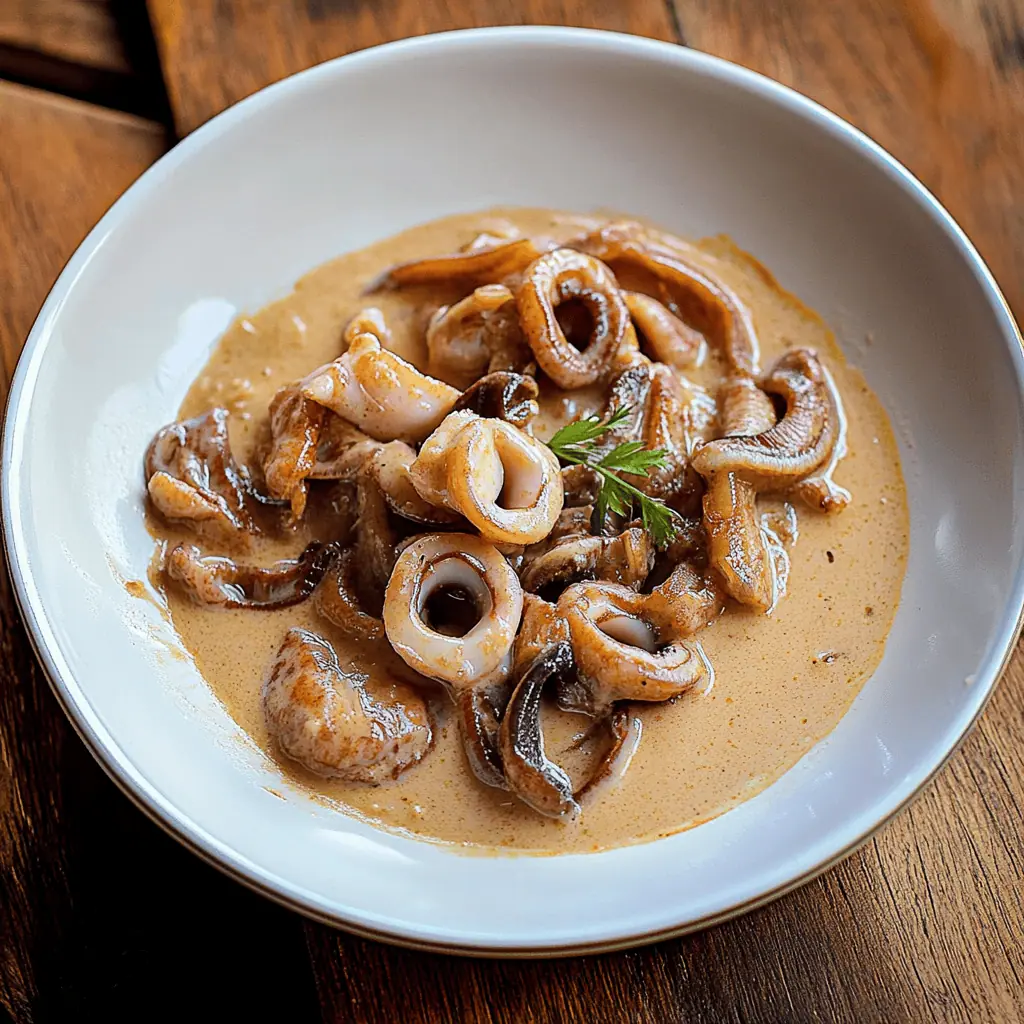
Why You'll Love This Recipe
- Perfect Texture: Learn the secret timing for achieving tender, never-rubbery squid
- Rich Sauce: Create that coveted creamy, ink-infused sauce that's Instagram-worthy
- Authentic Taste: Experience the perfect balance of traditional Filipino flavors
- Foolproof Method: Step-by-step instructions ensure success, even for beginners
- Make-Ahead Friendly: Tips for preparing components in advance
- Customizable Heat: Adjust spice levels to your preference
Ingredients
Each ingredient in this recipe serves a specific purpose to create the perfect Adobong Pusit sa Gata. The squid provides a tender canvas while vinegar tenderizes it and adds tang. Coconut milk creates the creamy base that balances the acidity.
Garlic, onion, and ginger form the aromatic foundation, while tomatoes add natural sweetness and body to the sauce. Thai chilies introduce a gentle heat that complements the richness. Fish sauce delivers that crucial umami depth, and the bay leaf contributes subtle earthy notes that round out all the flavors.
Together, they create a harmonious dish with layers of flavor that exemplifies Filipino coastal cuisine.

- 2 pounds squid/calamari
- 1 cup coconut milk
- ½ cup vinegar
- 4 garlic cloves, minced
- 1 onion, finely chopped
- 1 thumb-sized ginger, julienned
- 2 Roma tomatoes, diced
- 2 Thai chili peppers, sliced
- 1 bay leaf
- 1 tablespoon fish sauce
- ½ cup water
- Salt and pepper to taste
- 1 tablespoon cooking oil
Equipment
- Large skillet or wok: For cooking the squid and sauce with enough space for even cooking
- Sharp knife: For cleaning and cutting the squid into rings
- Cutting board: Preferably with a groove to catch squid juices
- Measuring cups and spoons: For accurate ingredient portions
- Strainer or colander: To drain the pre-cooked squid while reserving the cooking liquid
- Wooden spoon: To stir without scratching your cookware
- Paper towels: For patting dry the cleaned squid
- Heat-resistant bowls: For setting aside the pre-cooked squid
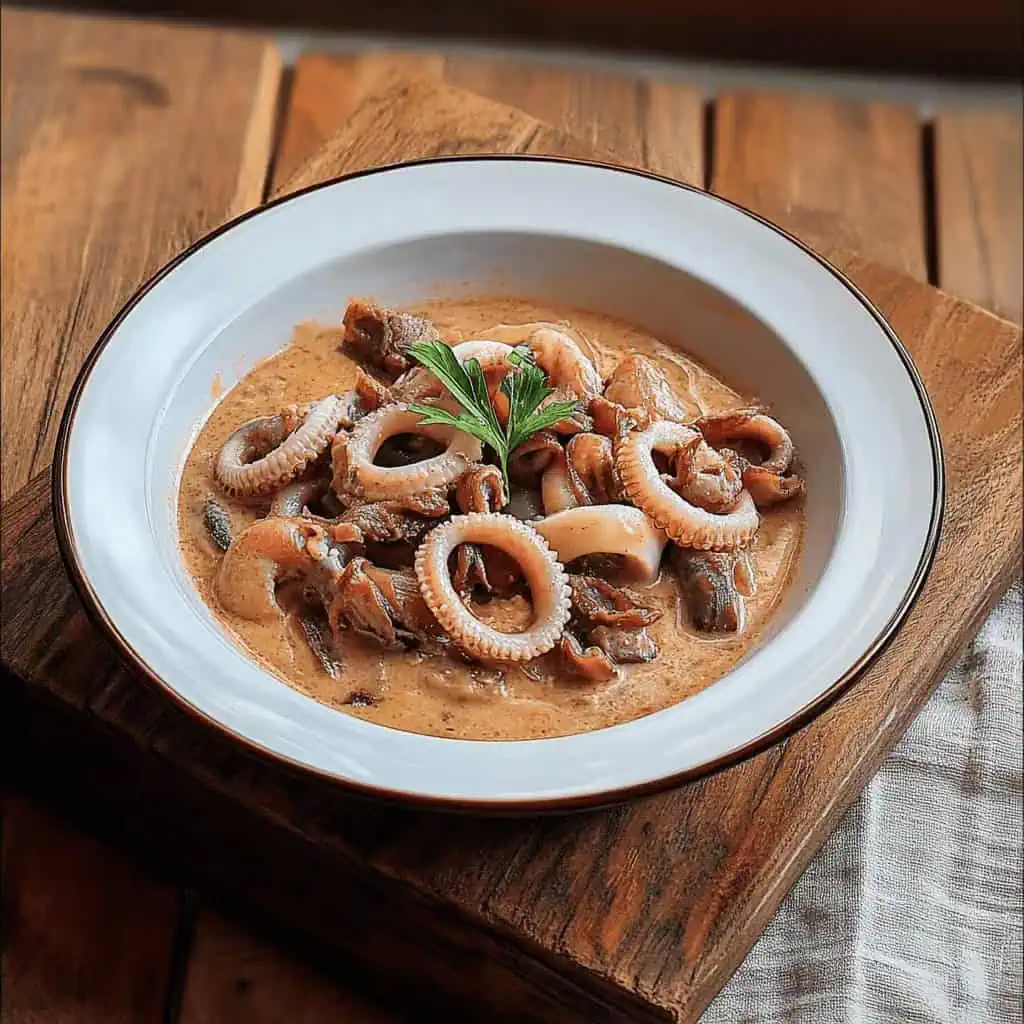
How To Make
- Keep squid chilled in the refrigerator at 40°F (4°C) before starting. Carefully clean the squid by removing the head, beak, tentacles, and transparent quill (backbone) from inside. Cut the squid body into 1-inch rings. Wash thoroughly under cold running water and pat dry with paper towels.
- Using a large pan set over medium-high heat (375°F/190°C), combine the cleaned squid, half of the minced garlic, vinegar, water, and bay leaf. Bring to a boil without stirring. This is very important as stirring will cause the squid to become tough. Cook for exactly 3 minutes. Drain the squid and reserve 1 cup of the cooking liquid. Set the squid aside.
- In the same pan over medium heat (350°F/175°C), heat the cooking oil until shimmering. Sauté the remaining garlic, onion, and ginger until fragrant and translucent, about 2 minutes. Add the diced tomatoes and gently mash them with the back of your spoon while cooking.
- Pour in the coconut milk and the reserved cooking liquid. Simmer until you see the oil begin to separate from the coconut milk, which takes about 5 minutes. This separation is a sign that the coconut milk is fully cooked.
- Lower the heat to 300°F/150°C and return the squid to the pan. Add the sliced chili peppers and fish sauce. Gently simmer for 3-5 minutes only. Be careful not to overcook the squid at this stage. Taste and season with salt and pepper as needed.
- The dish is done when the sauce is thick enough to coat the back of a spoon and the squid is tender but still has a slight bite to it. If the sauce is too thin, simmer for a few more minutes until it reaches your desired consistency.
- Serve hot over steaming white rice. For the best presentation, garnish with toasted garlic bits, sliced green onions, and serve with calamansi halves on the side.

Tips from Lola's Kitchen
- Select the freshest squid: Look for clear eyes, a clean ocean smell, and firm, glossy flesh. Fresh squid will give you the most tender results.
- Don't discard the squid ink: Keep it for that authentic dark color and rich flavor. If you prefer a lighter dish, you can rinse it away.
- Timing is everything: Never cook squid for too long – 3 minutes for the initial boil and 3-5 minutes for the final simmer is perfect. Overcooking results in rubbery squid.
- Let the vinegar breathe: Allow the vinegar to boil uncovered to mellow its acidity.
- Watch your coconut milk: Simmer gently until you see small oil droplets appearing on the surface – this indicates the coconut milk is fully cooked.
- Keep the heat low: After adding the coconut milk, maintain a gentle simmer to prevent curdling.
- Wait to season: Add salt at the end since the dish will concentrate as it cooks down.
Substitutions
- Squid: Cuttlefish or baby octopus can work, but adjust cooking times accordingly (octopus will need longer).
- Fresh coconut milk: Premium quality canned coconut milk is a good alternative. Avoid light coconut milk as it lacks the richness needed.
- Thai chilies: Bird's eye chilies provide similar heat, or use jalapeños for a milder kick.
- White vinegar: Cane vinegar gives the most authentic flavor, but apple cider vinegar works too.
- Fish sauce: Light soy sauce can substitute but will change the flavor profile slightly.
- Bay leaf: Dried lemongrass can provide an interesting aromatic alternative.
- Fresh tomatoes: In a pinch, 1 tablespoon of tomato paste can replace fresh tomatoes.
Troubleshooting
- Rubbery squid: You likely overcooked it. Remember, squid requires either very quick cooking (under 5 minutes total) or very long cooking (over 30 minutes). Next time, strictly time your cooking.
- Watery sauce: Continue to simmer until the sauce reduces and thickens. Be patient and keep the heat low.
- Too acidic: Add a pinch of sugar or a bit more coconut milk to balance the vinegar.
- Too spicy: Add more coconut milk to tame the heat, or serve with extra rice on the side.
- Curdled coconut milk: Your heat was likely too high. For this batch, try whisking vigorously to re-emulsify. In the future, keep the heat low after adding coconut milk.
- Sauce too thick: Add a small splash of hot water or additional coconut milk to thin it out.
Storage & Reheating
- Refrigeration: Store in an airtight container for up to 2 days. The flavors actually improve overnight as they meld together.
- Freezing: You can freeze for up to 1 month, but for best results, freeze the sauce separately from the squid.
- Reheating: Always reheat gently over low heat. Microwave reheating is not recommended as it can make the squid tough.
- Sauce consistency: When reheating, add a splash of fresh coconut milk if the sauce has thickened too much in storage.
- Cold option: This dish can also be enjoyed cold as a salad-like appetizer. Just bring to room temperature before serving.
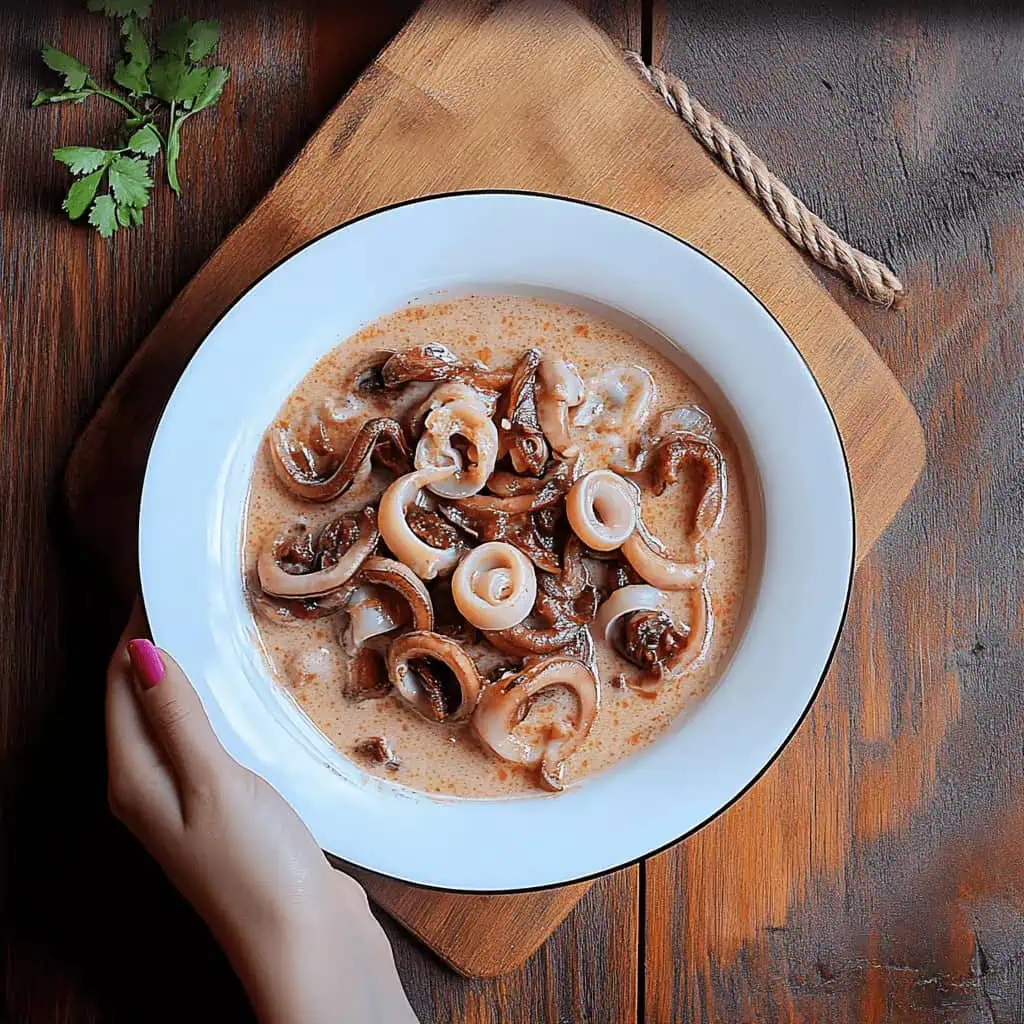
FAQ
How do I know when the squid is perfectly cooked?
Perfectly cooked squid should be opaque and firm but still tender when pierced with a fork. It should have a slight resistance but not be rubbery. For rings, they should curl into a C shape, not tightly coiled O shapes (which indicates overcooking).
Can I make this dish ahead for a party?
Yes, but I recommend slightly undercooking the squid initially, then finishing it just before serving. Alternatively, prepare the sauce a day ahead and cook the squid fresh when ready to serve.
Why is squid ink important in this recipe?
The ink adds a unique briny flavor and the dramatic black color that makes this dish special. It also naturally thickens the sauce. However, it's optional if you prefer a cleaner, lighter-colored sauce.
How do I clean squid without making a mess?
Work near the sink, wear food-safe gloves, and use a dedicated cutting board. Pull the head and tentacles from the body in one motion, remove the quill (plastic-like backbone), peel off the spotted skin, and rinse thoroughly.
Can I use frozen squid?
Yes, but thaw it completely in the refrigerator overnight and pat it very dry before cooking to prevent excess water from diluting your sauce.
What makes a good accompaniment to this dish?
Steamed white rice is traditional, but garlic fried rice (sinangag) adds another dimension. A simple cucumber and tomato salad dressed with vinegar provides a fresh contrast to the rich dish.
Is this dish supposed to be very spicy?
The heat level is traditionally moderate but entirely adjustable to your taste. Start with fewer chilies if you're sensitive to spice, and remember that the coconut milk helps temper the heat.
Related
Looking for other recipes like this? Try these:

Adobong Pusit sa Gata (Filipino Squid in Spicy Coconut Milk)
Ingredients
- 2 pounds pusit squid/calamari
- 1 cup gata coconut milk
- ½ cup suka vinegar
- 4 bawang na puti garlic cloves
- 1 sibuyas onion
- 1 luya thumb-sized ginger
- 2 kamatis Roma tomatoes
- 2 siling pangsigang Thai chili peppers
- 1 dahon ng laurel bay leaf
- 1 patis fish sauce
- ½ cup tubig water
- Asin at paminta salt and pepper
- 1 mantika cooking oil
Instructions
- Keep squid chilled in the refrigerator at 40°F (4°C) before starting. Maingat na linisin ang pusit - carefully clean the squid by removing the head, beak, tentacles, and transparent quill (backbone) from inside. Cut the squid body into 1-inch rings. Hugasan sa malamig na tubig - wash thoroughly under cold running water and pat dry with paper towels.
- Using a large pan set over medium-high heat (375°F/190°C), combine the cleaned squid, half of the minced garlic, vinegar, water, and bay leaf. Pakuluin ng hindi hinahalo - bring to a boil without stirring. This is very important as stirring will cause the squid to become tough. Cook for exactly 3 minutes. Drain the squid and reserve 1 cup of the cooking liquid. Set the squid aside.
- In the same pan over medium heat (350°F/175°C), heat the cooking oil until shimmering. Igisa ang bawang, sibuyas, at luya - sauté the remaining garlic, onion, and ginger until fragrant and translucent, about 2 minutes. Add the diced tomatoes and gently mash them with the back of your spoon while cooking.
- Ibuhos ang gata - pour in the coconut milk and the reserved cooking liquid. Simmer until you see the oil begin to separate from the coconut milk (called litid in Tagalog), which takes about 5 minutes. This separation is a sign that the coconut milk is fully cooked.
- Lower the heat to 300°F/150°C and return the squid to the pan. Add the sliced chili peppers and fish sauce. Pasingawan ng dahan-dahan - gently simmer for 3-5 minutes only. Be careful not to overcook the squid at this stage. Taste and season with salt and pepper as needed.
- The dish is done when the sauce is thick enough to coat the back of a spoon and the squid is tender but still has a slight bite to it. If the sauce is too thin, simmer for a few more minutes until it reaches your desired consistency.
- Serve hot over steaming white rice. For the best presentation, garnish with toasted garlic bits (sinangag na bawang), sliced green onions, and serve with calamansi halves on the side.
- To prevent the sauce from sticking to the pan, maintain low heat during the final cooking stage and stir occasionally. If the sauce becomes too thick, you can thin it out with a small amount of hot water or coconut milk.
- Leftovers can be stored in an airtight container in the refrigerator for up to 2 days. When reheating, do so gently over low heat, adding a splash of coconut milk if needed to restore the sauce's consistency.
- Important: Never let the coconut milk boil aggressively once added, as this can cause it to separate and become grainy. Keep the heat low and watch for gentle bubbling around the edges of the pan.
Tips from Lola's Kitchen
- Choose fresh squid with clear eyes and a clean ocean smell
- Keep the squid ink for authentic color, or remove for a lighter dish
- Never overcook the squid – it should be tender, not rubbery
- Use fresh, thick coconut milk for the best results
- Let the vinegar boil uncovered to mellow its acidity
- Adjust chili peppers according to your heat preference
Nutrition
The Story Behind Adobong Pusit sa Gata (Filipino Squid in Spicy Coconut Milk)
Adobong Pusit sa Gata stands as a brilliant testament to Filipino coastal ingenuity, where two beloved cooking techniques - adobo and gata - come together in perfect harmony. This traditional Filipino seafood dish originated in the coconut-rich regions of Southern Luzon, particularly in Bicol and Quezon Province, where fresh seafood and coconut milk are daily kitchen staples. While classic adobo typically features pork or chicken in vinegar and soy sauce, coastal communities created their own spin using the abundance of fresh squid from their waters.
What makes this Filipino squid recipe truly special is its clever fusion of techniques. The squid is first prepared adobo-style, cooking in vinegar and garlic - a method that Filipinos have used since pre-colonial times to preserve food in our tropical climate. But the addition of gata (coconut milk) elevates this humble preparation into something extraordinary. This combination wasn't just delicious; it was practical too. The natural ink from the squid (tinta ng pusit) combines with coconut milk to create a uniquely rich, creamy sauce that's distinctly Filipino.
In modern Filipino cuisine, Adobong Pusit sa Gata has evolved from a simple coastal dish to a sought-after specialty. You'll find it served at everything from casual carinderias to upscale Filipino restaurants, though many will tell you the best versions still come from home kitchens where the recipe has been passed down through generations. Each region has its own twist - Bicolanos might add siling labuyo for extra heat, while others might include ginger or lemongrass for added aromatics. But the core elements remain the same: fresh squid, coconut milk, vinegar, and that magical ink that transforms the dish into something unforgettable.
Today's home cooks are rediscovering this traditional Filipino seafood recipe, appreciating how it transforms affordable squid into an impressive dish that's both everyday-friendly and special-occasion worthy. Whether you're cooking it for a family dinner or impressing guests at a party, this coconut milk squid adobo recipe proves why Filipino cuisine deserves its growing spotlight on the global culinary stage. It's more than just a recipe - it's a delicious piece of our coastal heritage that continues to evolve while staying true to its flavorful roots.
Remember: Perfect adobong pusit sa gata isn't just about the darkness of the sauce—it's about achieving that ideal balance where the squid remains tender, the adobo tang comes through, and the coconut milk binds everything together in a silky, flavorful finish.
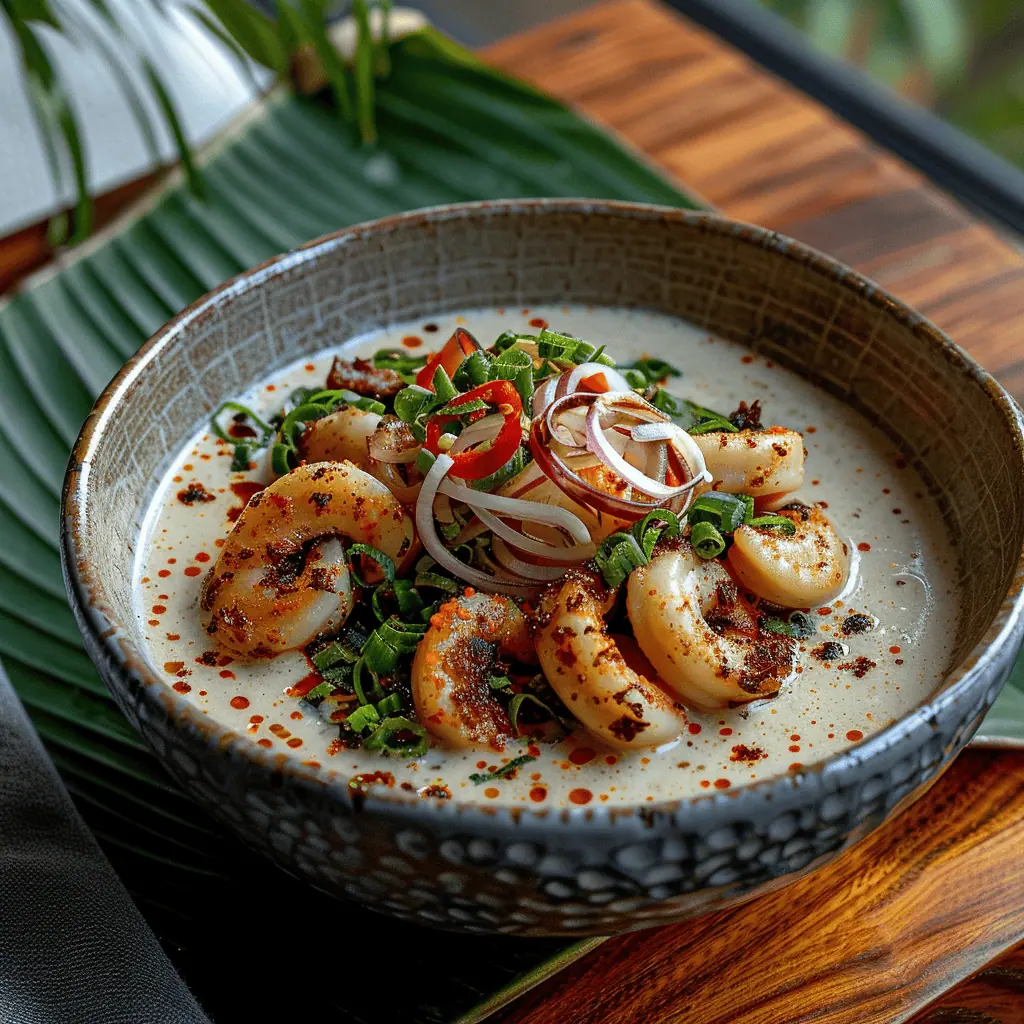


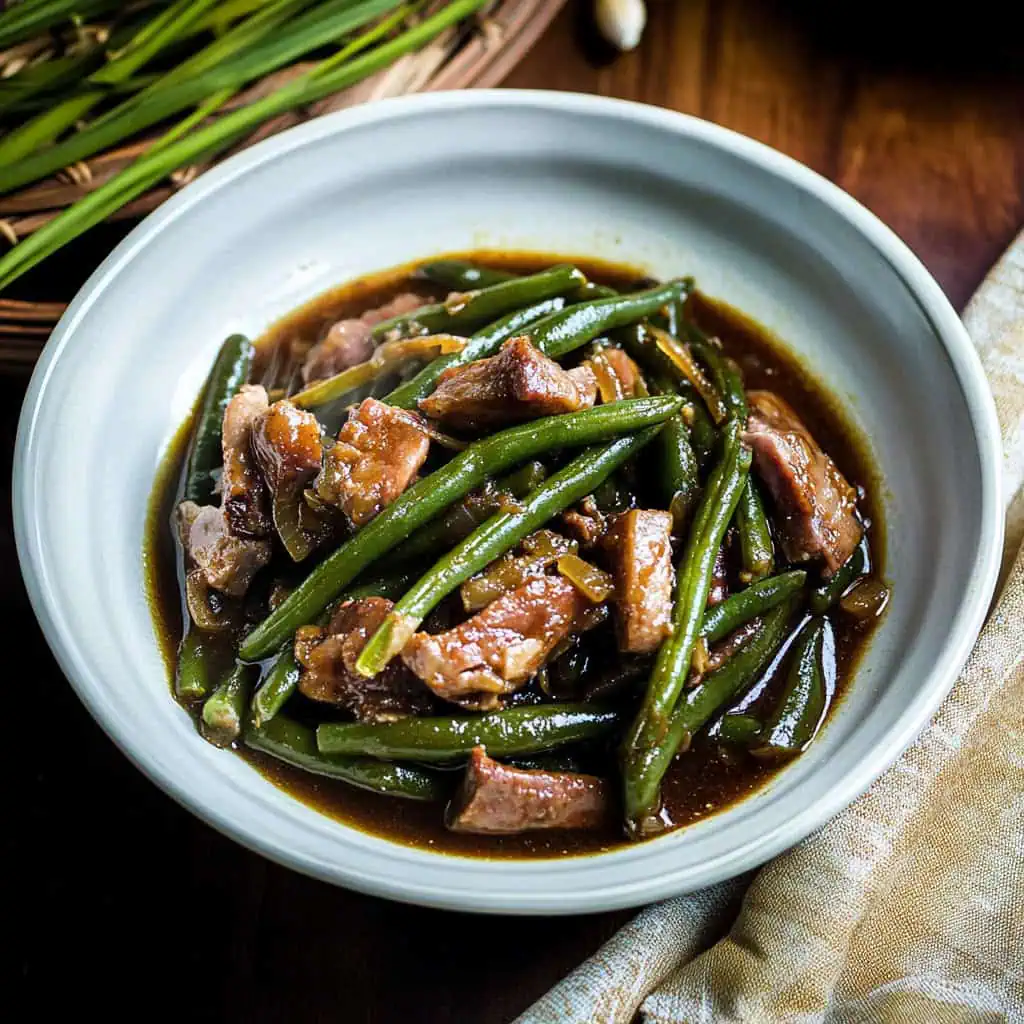

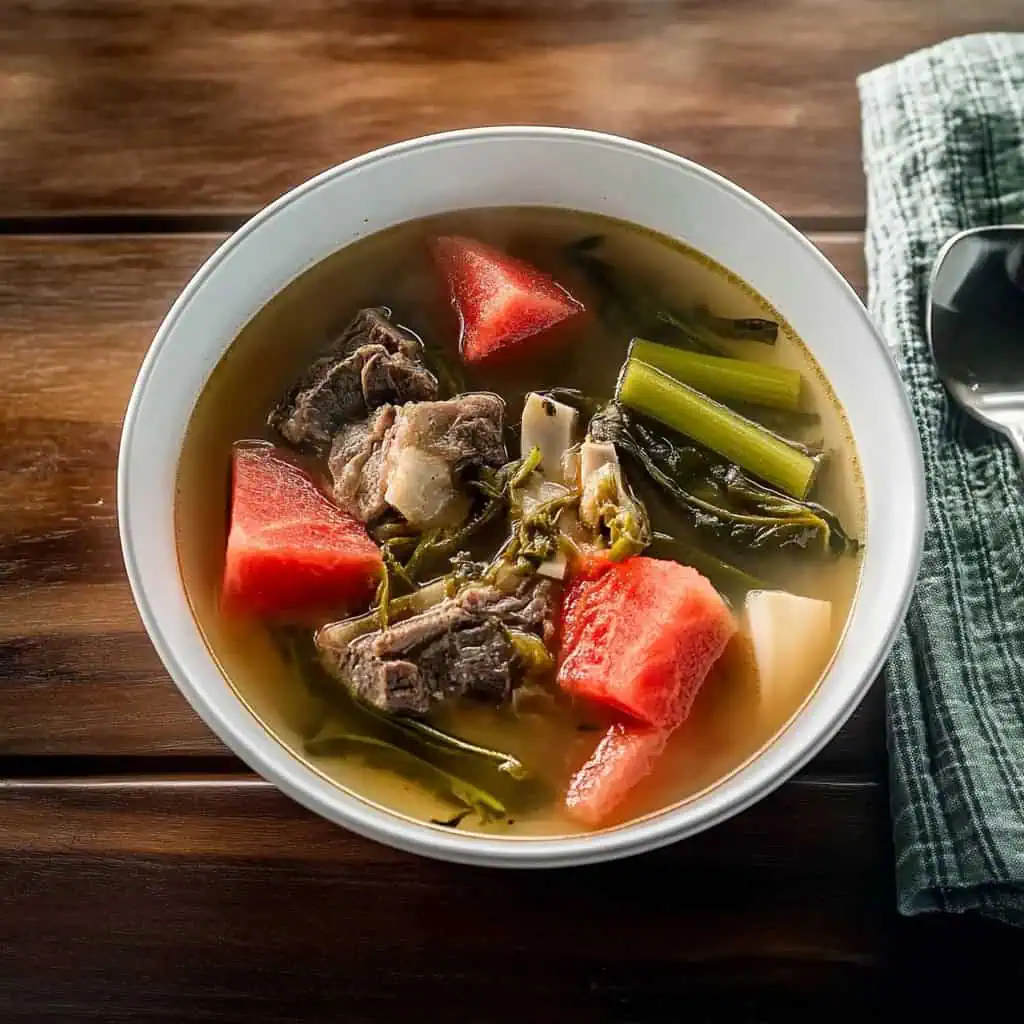




Comments
No Comments